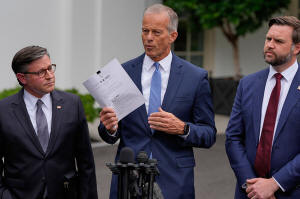Congressional leaders leave White House meeting without deal to avoid
government shutdown
[September 30, 2025]
By STEPHEN GROVES and MARY CLARE JALONICK
WASHINGTON (AP) — A government shutdown fast approaching, Democratic and
Republican congressional leaders left a White House meeting with
President Donald Trump Monday afternoon showing no sign of compromising
from their entrenched positions in order to avoid a lapse in funding.
If government funding legislation isn't passed by Congress and signed by
Trump on Tuesday night, many government offices across the nation will
be temporarily shuttered and nonexempt federal employees will be
furloughed, adding to the strain on workers and the nation's economy.
But lawmakers were locked in an impasse Monday. Democrats are using one
of their few points of leverage to demand legislation to extend health
care benefits. But Republicans are refusing to compromise and daring
Democrats to vote against legislation that would keep government funding
mostly at current levels.
“There are still large differences between us,” Senate Democratic leader
Chuck Schumer said as he left the White House.
Vice President JD Vance told reporters after the meeting, “I think we’re
headed into a shutdown because the Democrats won’t do the right thing.”
Negotiating with Trump
Trump has shown little interest in entertaining Democrats' demands on
health care, even as he agreed to hold a sit-down meeting Monday with
Schumer, along with Senate Majority Leader John Thune, House Speaker
Mike Johnson and House Democratic leader Hakeem Jeffries.

It was Trump’s first meeting with the “big four” leaders in Congress
since retaking the White House for his second term, yet the Republican
president said repeatedly heading into the meeting that he fully expects
the government to enter a shutdown this week.
As he headed into the meeting, Trump made it clear he had no intention
to negotiate on Democrats’ current terms.
“They’re going to have to do some things because their ideas are not
very good ones,” he said.
Still, Schumer said after the meeting that they had “had candid, frank
discussions” with Trump about health care and suggested that the
president was more open to their proposals than the Republican leaders
who were also in the meeting. Vance also said that Trump found several
points of agreement on policy ideas.
Schumer said the president “was really listening to us," adding, “It’s
in his hands.”
Democrats’ health care demands
Democrats are pushing for an extension to Affordable Care Act tax
credits that have subsidized health insurance for millions of people
since the COVID-19 pandemic. The credits, which are designed to expand
coverage for low- and middle-income people, are set to expire at the end
of the year.
“Democrats are fighting to protect the health care of the American
people,” said Jeffries, a New York Democrat. “We are not going to
support a partisan Republican spending bill that continues to gut the
health care of everyday Americans.”
Some Republicans are open to extending the tax credits but want changes.
But Thune, a South Dakota Republican, has pressed Democrats to vote for
the funding bill and take up the debate on tax credits later.

[to top of second column]
|

Senate Majority Leader John Thune, R-S.D., talks to reporters
outside the West Wing of the White House, Monday, Sept. 29, 2025, in
Washington, as House Speaker Mike Johnson of La., and Vice President
JD Vance, listen. (AP Photo/Alex Brandon)

“We’re willing to sit down and work with them on some of the issues
they want to talk about,” he told reporters at the White House,
adding, “But as of right now, this is a hijacking of the American
people, and it's the American people who are going to pay the
price.”
How will Democrats vote?
To hold on to their negotiating leverage, Senate Democrats will
likely have to vote against a bill to temporarily extend government
funding on Tuesday, just hours before a shutdown — an uncomfortable
position for a party that has long denounced shutdowns as pointless
and destructive.
The bill has already passed the Republican-controlled House and
would keep the government funded for seven more weeks while Congress
works on annual spending legislation.
Any legislation to fund the government will need support from at
least 60 senators in the 100-member Senate. That means that at least
eight Democrats would have to vote for the short-term funding bill,
because Republican Sen. Rand Paul of Kentucky is expected to vote
against it.
During the last potential government shutdown in March, Schumer and
nine other Democrats voted to break a filibuster and allow a
Republican-led funding bill to advance to a final vote. The New York
Democrat faced fierce backlash from many in his own party for that
decision, with some even calling for him to step down as Democratic
leader.
Senate Democrats have begun to discuss some possible next steps if
the government does shut down — potentially a proposal for a one- or
two-week stopgap if Republicans will work with them on a health care
fix, according to several people familiar with the private talks who
requested anonymity to discuss them. But there is no consensus in
the caucus about how to proceed, or guarantees that Republicans and
Trump would negotiate.
Shutdown preparations begin
Federal agencies were sending out contingency plans if funding
lapses at 12:01 a.m. Wednesday. They included details on what
offices would stay open and which employees would be furloughed.
The Trump administration is using the process to potentially layoff
more federal employees. The plans heap more pressure Democratic
lawmakers to back away from their demands.

Russ Vought, Trump's budget director, told reporters at the White
House that a shutdown would be managed “appropriately, but it is
something that can all be avoided” if Senate Democrats accepted the
House-passed bill.
Before joining the administration, Vought had advised hardline
conservatives in Congress to use the prospect of a shutdown to
negotiate for policy concessions. But on Monday, he berated
Democrats for engaging in a similar ploy.
“This is hostage taking. It is not something that we are going to
accept,” he said.
___
Associated Press writers Seung Min Kim, Lisa Mascaro, Kevin Freking
and Joey Cappelletti in Washington contributed.
All contents © copyright 2025 Associated Press. All rights reserved |